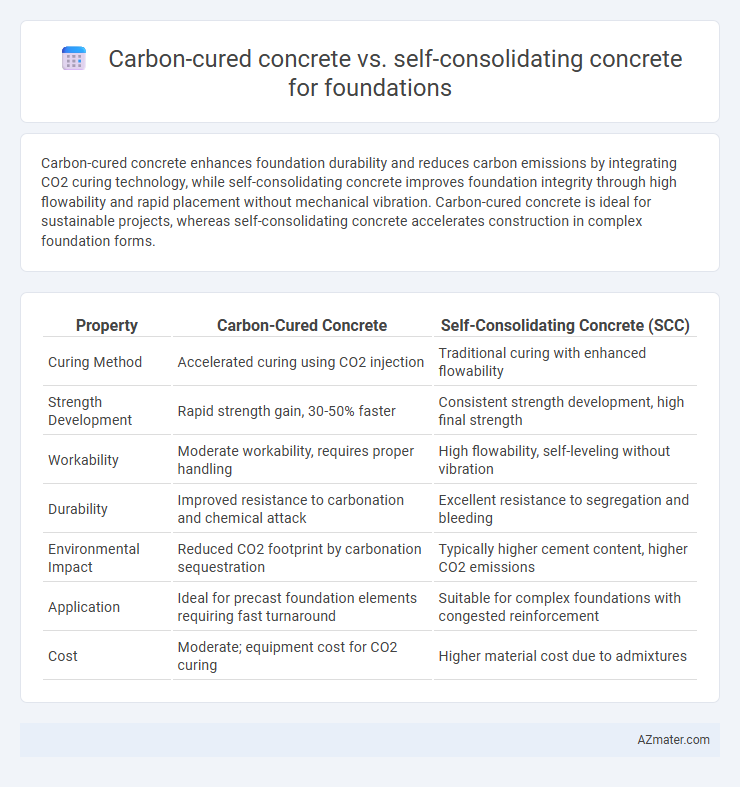Carbon-cured concrete enhances foundation durability and reduces carbon emissions by integrating CO2 curing technology, while self-consolidating concrete improves foundation integrity through high flowability and rapid placement without mechanical vibration. Carbon-cured concrete is ideal for sustainable projects, whereas self-consolidating concrete accelerates construction in complex foundation forms.
Table of Comparison
| Property | Carbon-Cured Concrete | Self-Consolidating Concrete (SCC) |
|---|---|---|
| Curing Method | Accelerated curing using CO2 injection | Traditional curing with enhanced flowability |
| Strength Development | Rapid strength gain, 30-50% faster | Consistent strength development, high final strength |
| Workability | Moderate workability, requires proper handling | High flowability, self-leveling without vibration |
| Durability | Improved resistance to carbonation and chemical attack | Excellent resistance to segregation and bleeding |
| Environmental Impact | Reduced CO2 footprint by carbonation sequestration | Typically higher cement content, higher CO2 emissions |
| Application | Ideal for precast foundation elements requiring fast turnaround | Suitable for complex foundations with congested reinforcement |
| Cost | Moderate; equipment cost for CO2 curing | Higher material cost due to admixtures |
Introduction to Foundation Concrete Types
Carbon-cured concrete enhances foundation durability by accelerating the curing process through carbon dioxide injection, resulting in improved strength and reduced carbon footprint. Self-consolidating concrete (SCC) offers superior flowability and compaction without mechanical vibration, ensuring uniformity and reducing labor time for complex foundation forms. Both types address specific construction challenges: carbon-cured concrete optimizes environmental impact, while SCC improves placement efficiency and surface quality in foundation work.
What is Carbon-Cured Concrete?
Carbon-cured concrete is a sustainable building material that accelerates the curing process by injecting carbon dioxide (CO2) during mixing, enhancing strength and reducing carbon emissions. This method traps CO2 within the concrete matrix, promoting rapid carbonation and improving durability for foundation applications. In contrast, self-consolidating concrete relies on high fluidity and flowability without mechanical vibration, focusing on ease of placement rather than carbon capture.
What is Self-Consolidating Concrete?
Self-consolidating concrete (SCC) is a highly flowable concrete mixture designed to spread into place, fill formwork, and encapsulate reinforcement without the need for mechanical vibration. It offers superior workability, minimizes labor costs, and ensures uniform compaction, making it ideal for complex foundation structures. Compared to carbon-cured concrete, SCC provides enhanced surface finish and structural integrity, particularly in tight or heavily reinforced foundation applications.
Key Properties Comparison
Carbon-cured concrete offers enhanced durability and reduced curing time due to accelerated carbonation, making it highly resistant to chemical attacks and shrinkage for foundations. Self-consolidating concrete (SCC) exhibits superior flowability and segregation resistance, allowing it to fill complex foundation forms without mechanical vibration, ensuring high surface finish quality and uniform density. Both concretes provide distinct advantages: carbon-cured concrete excels in strength gain and sustainability, while SCC prioritizes workability and ease of placement in foundation construction.
Strength and Durability Analysis
Carbon-cured concrete demonstrates enhanced strength and improved durability through accelerated carbonation, which densifies the microstructure and reduces permeability, making it highly resistant to chemical attacks and freeze-thaw cycles in foundation applications. Self-consolidating concrete (SCC) offers uniform compaction and homogeneous material distribution without mechanical vibration, resulting in superior surface finish and reduced voids that increase structural integrity and long-term durability in complex foundation forms. Comparative analysis reveals carbon-cured concrete's advantage in early-age strength gain and enhanced durability, while SCC excels in workability and minimizing defects that compromise foundation lifespan.
Environmental Impact Assessment
Carbon-cured concrete significantly reduces carbon dioxide emissions by utilizing captured CO2 in its curing process, leading to a lower carbon footprint compared to traditional concretes. Self-consolidating concrete, while beneficial for reducing labor and improving structural performance, generally relies on conventional cement production, which contributes to higher greenhouse gas emissions. Environmental Impact Assessment shows carbon-cured concrete as a more sustainable foundation material option by directly sequestering CO2 and lowering overall environmental impact.
Workability and Placement Efficiency
Carbon-cured concrete offers enhanced workability with improved flowability due to its optimized mix design incorporating CO2 curing techniques, resulting in faster setting times and reduced shrinkage. Self-consolidating concrete (SCC) demonstrates superior placement efficiency by eliminating the need for vibration, enabling it to flow smoothly into complex formworks and around dense reinforcement, thereby accelerating foundation construction. The choice between carbon-cured concrete and SCC hinges on balancing the benefits of accelerated curing and sustainability with the ease of placement and labor savings in foundation projects.
Cost Implications and Lifespan
Carbon-cured concrete reduces carbon emissions by utilizing CO2 during curing, often resulting in lower long-term maintenance costs due to enhanced durability and faster curing times, though initial material costs can be higher than traditional methods. Self-consolidating concrete (SCC) offers improved flowability and reduced labor costs by eliminating the need for mechanical vibration, but it may require higher-quality admixtures, impacting upfront expenses. While carbon-cured concrete can extend foundation lifespan by improving resistance to cracking and environmental degradation, SCC provides consistent compaction that minimizes voids, contributing to structural integrity and potentially comparable lifespan outcomes.
Ideal Applications for Foundations
Carbon-cured concrete offers enhanced durability and reduced carbonation, making it ideal for foundations exposed to harsh environmental conditions or requiring long-term sustainability. Self-consolidating concrete is preferred for complex foundation geometries where high flowability and minimal vibration ensure complete mold filling and structural integrity. Both types optimize foundation performance, with carbon-cured concrete excelling in longevity and self-consolidating concrete in ease of placement and finish quality.
Choosing the Right Concrete for Your Project
Carbon-cured concrete offers enhanced durability and faster strength gain by utilizing carbon dioxide in the curing process, making it ideal for foundations requiring high performance and environmental benefits. Self-consolidating concrete (SCC) provides excellent workability and eliminates the need for vibration, ensuring uniform placement in complex foundation forms and reducing labor costs. Selecting the right concrete depends on project demands such as structural load, curing time, environmental impact, and ease of installation, where carbon-cured concrete suits sustainability goals and SCC excels in intricate formworks.

Infographic: Carbon-cured concrete vs Self-consolidating concrete for Foundation
 azmater.com
azmater.com